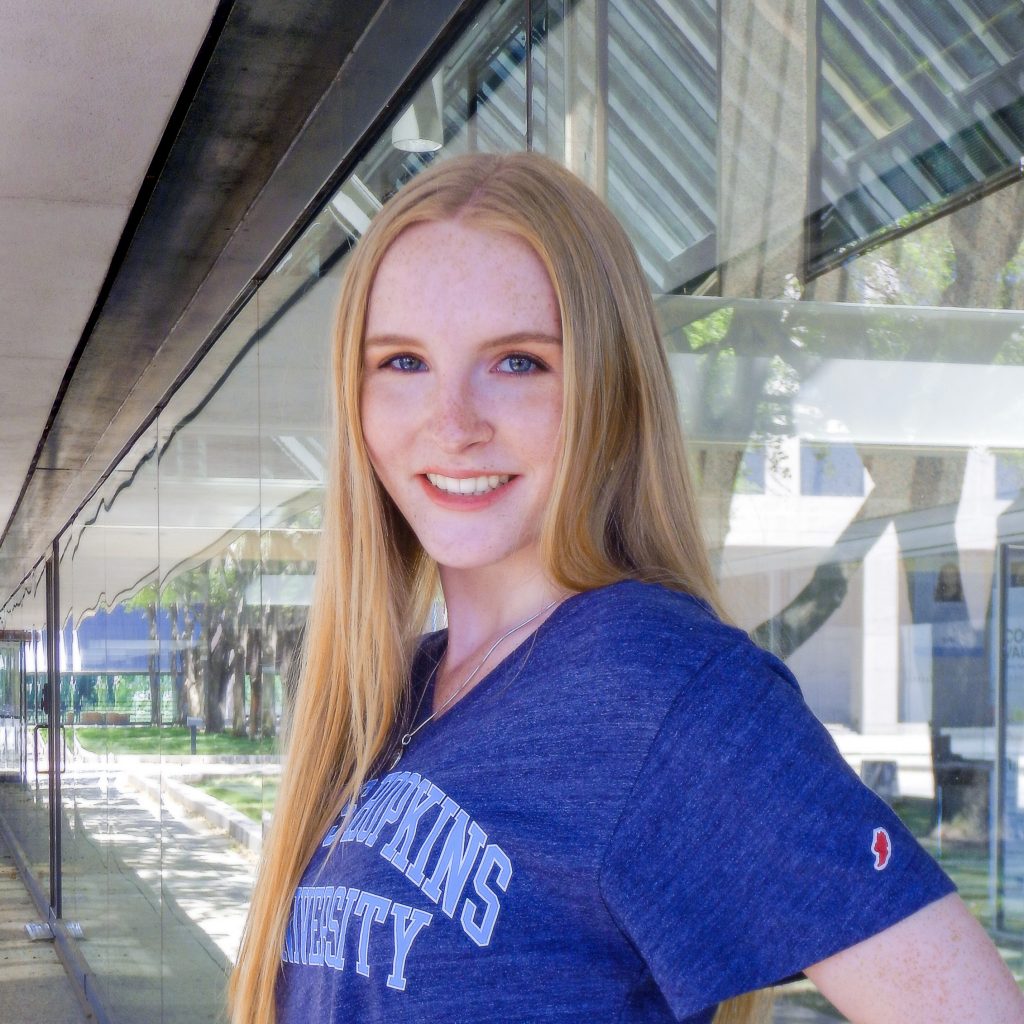The second PURA student spotlight is Kylie Fuller, a third-year student at JHU studying Psychology and Anthropology. Fuller has worked as a research assistant for three years, receiving two PURA awards. Her 2021 PURA project is titled “The Effect of Norm and Construal Activation on Pro-Environmental Behavior on Instagram Users”. The PURA program was established in 1993 with a generous endowment by the Hodson Trust, which supports Hopkins undergraduate students as they engage in independent research and scholarly and creative projects.

- Could you briefly describe your research?
My project’s current title is “The Effect of Norm and Construal Activation on Instagram Users’ Pro-Environmental Behavior”. Essentially, what I’m exploring is the elements of an effective pro-environmental social media campaign. Social media has transformed the face of social movements, and research suggests that social media play a critical role in encouraging pro-environmental behavior and informing the public about climate change. In order to harness that potential, I am curious how social media psychology influences the efficacy of these campaigns. I’ve launched a survey on Amazon Mechanical Turk where participants are exposed to varying types of pro-environmental media and asked how likely they are to act on that media, whether it be donating, volunteering, etc. So far, I’ve received almost 600 responses, and the analysis of the results has just begun. There’s a lot of potential moderating variables we have to account for, but I’m hoping to identify some elements that have a significant impact on users’ behavior.
- Why did you decide to apply for the PURA awards?
For this project, I really wanted my sample to be representative of the average Instagram user. A lot of psychology studies are limited to the WEIRD demographic (Western, educated, industrialized, rich, and democratic), and many are even more limited to college students. Climate change communication needs to reach a much broader audience than that small demographic. To generate a more representative sample, I knew immediately that I wanted to use Amazon Mechanical Turk or a similar platform, but that requires paying participants and registration fees. PURA funding allowed me to not only use that platform, but I could recruit a large sample, which I’m hoping will lend my study more statistical power. I also appreciated the opportunity to practice grant writing, which is so important in the research community.
- What are your next steps for your research?
The next few months will be all about running statistical analyses. The survey was relatively short, but because of it’s design, there are a lot of variables and predictors that can be explored in a variety of ways. I’m looking forward to seeing all the different results that come out of this study. I’m hoping to present my study at a conference this year and look into options for publication this year, too, but that really depends on how much analysis I end up doing. With a study like this, I could easily explore all the variables and relationships for a long time.
- What recommendations/advice do you have for future PURA recipients?
The most obvious but most critical thing is to have a mentor that’s going to challenge you during the writing process. Writing a project proposal, especially such a short one, requires a million re-writes, and having a mentor that will push you to continually improve your writing (even when you’re tempted to submit the fifth draft) is unimaginably helpful. I also think it’s impossible to write a good proposal without feeling really confident about your material. By the time I submitted my final draft, I felt like I could recite every aspect of my project. Developing a strong familiarity with the subject matter, even though I’d never researched this particular topic, was crucial. Researching something I find really interesting and important made that process a lot easier.
- How do you believe JHU helped you cultivate your research skills?
I’m really thankful for having so many great mentors at JHU. I think the most difficult thing about the research process is how daunting it is: Finding a topic you like, determining a gap in the literature, learning the necessary methods, applying for funding, etc. My professors have made the process so much easier by giving me access to resources, pushing me intellectually, and letting me make mistakes. I learn a lot by doing, and my mentors have never been afraid to throw me in the deep end. It’s been really incredible being able to approach my professors and say, “I want to do this thing”, and them responding with, “Let’s make it happen.”

